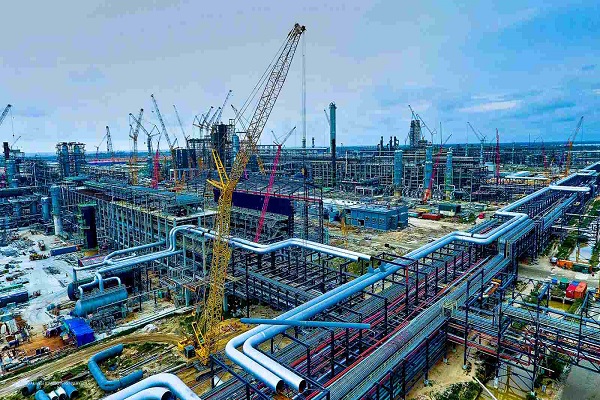As Dangote Refinery rolled out petrol from its plant yesterday, Nigerians will be able to buy the product produced by the firm from tomorrow.
In a major domestication of the energy needs in the country, President of Dangote Refinery, Alhaji Aliko Dangote displayed a distinctive sample of the first petrol from the refinery.With him were Vice President of Oil and Gas at Dangote Industries Limited (DIL), Devakumar Edwin, and Group Commercial Operations Director at DIL, Hajiya Fatima Aliko-Dangote.
Dangote described the rollout as a milestone for the nation with several opportunities to address contagious economic challenges.
He also itemised the boost to the economy by the full operation of the refinery, which was inaugurated by former President Muhammadu Buhari in May, last year.The business mogul did not come out with any product until April 2, when diesel and Jet A1 were rolled out of the plant.
Yesterday’s event is anoter major development in the history of the 650,000 barrels per day plant.
Accompanied by Vice President of Oil and Gas at Dangote Industries Limited (DIL), Devakumar Edwin, and Group Commercial Operations Director at DIL, Hajiya Fatima Aliko-Dangote, Dangote expressed gratitude to Nigerians for their support and praised President Bola Tinubu for fostering an environment that made the successful launch of the 650,000 barrels per day refinery possible.
He said: “Today is a momentous occasion because Nigeria has not produced petrol, or gasoline, for many years. As I stand here, I want to extend my gratitude to the people of Nigeria and to President Bola Ahmed Tinubu’s administration for creating the environment that has enabled us to achieve this monumental task. This development will provide energy for our nation’s growth, development, and prosperity.
“I want to personally thank Mr. President for introducing the concept of ‘naira for crude’ and ‘naira for products.’ This initiative will bring much-needed stability to the naira by reducing the demand for dollars in the market by 40 per cent, which will help stabilise the exchange rate.
“But that’s not all. It will also address issues like ‘round-tripping,’ where fuel is documented but doesn’t actually enter Nigeria. With this new refinery, we will have a clear view of true consumption.
“We’ll be able to track every loaded truck and, as much as possible, monitor loaded ships. This will allow us to precisely determine consumption patterns, though that’s a topic for another discussion
“Today, we are here to celebrate and give thanks to God Almighty for bringing us to this point where we can produce gasoline. Many doubted we would achieve this, but we have delivered.”
He pointed out that the Dangote petrol might be a bit cleaner compared to what the country had before because it is of the highest quality, which will ensure that vehicle’s engine will last longer.
“The quality of this fuel can match any premium standard worldwide, including those in Europe and America. No one can surpass us in terms of quality. Today is truly a celebration for us Nigerians,” Dangote said.
“Today, we are here to celebrate and give thanks to God Almighty for bringing us to this point where we can produce gasoline. Many doubted we would achieve this, but we have delivered.”
He pointed out that the Dangote petrol might be a bit cleaner compared to what the country had before because it is of the highest quality, which will ensure that vehicle’s engine will last longer.
“The quality of this fuel can match any premium standard worldwide, including those in Europe and America. No one can surpass us in terms of quality. Today is truly a celebration for us Nigerians,” Dangote said.
“Today, we are here to celebrate and give thanks to God Almighty for bringing us to this point where we can produce gasoline. Many doubted we would achieve this, but we have delivered.”
He pointed out that the Dangote petrol might be a bit cleaner compared to what the country had before because it is of the highest quality, which will ensure that vehicle’s engine will last longer.
“The quality of this fuel can match any premium standard worldwide, including those in Europe and America. No one can surpass us in terms of quality. Today is truly a celebration for us Nigerians,” Dangote said.He added that by next month, Nigeria will have no need to import polypropylene as the group’s petrochemical plant will be fully capable of meeting all local demands.
While assuring that the refinery will guarantee the availability of petrol locally, Dangote clarified that the nation’s oil company, the Nigerian National Petroleum Corporation Limited (NNPCL) is responsible for controlling petrol pump prices.
“Pricing is controlled by NNPC. For now, we focus on ensuring that the products are available—that’s what I can guarantee,” Dangote said.The Nigerian Midstream and Downstream Petroleum Regulatory Authority (NMDPRA) said it has finalised an agreement with NNPCL to sell crude oil to Dangote refinery in naira.
NMDPRA made this known in statement issued via its X (twitter) handle yesterday during a meeting held in it headquarter in Abuja.NMDPRA further confirmed that the refinery is now poised to supply an initial 25 million litres of PMS into the domestic market.The regulator added that the refinery will subsequently increase that amount to 30 million liters daily from October.
At the NMDPRA headquarters in Abuja, NNPCL reached an agreement to commence crude oil sale and supply to Dangote Refinery in local currency,” NMDPRA stated.
This latest development is coming as Nigerians continue to grapple with a severe nationwide petrol scarcity, which became more acute in the last two weeks.Chairman, Geregu Power, Femi Otedola, praised Dangote for the official commencement of petrol production at the Dangote Refinery noting that the rollout would end malfunctions in the oil sector.
He urged depot owners in the country, including members of the Major Energy Marketers Association of Nigeria (MEMAN), the Depot and Petroleum Products Marketers Association of Nigeria and other independent petroleum marketers, to prepare for a significant shift in the industry.
Otedola advised them to consider dismantling their petroleum product depots and selling them as scrap while market conditions are still favourable.An analyst stated that the Dangote petrol’s distinguishing feature of near whiteness as water was because the plant uses ethanol as its refining additive.
The analyst said: “Petrol has different colours depending on the additives used during refining. When it’s red that means Octane was added.
“When it’s slightly green then Octane is slightly very much. When is yellow it means it has no lead in it. That means it’s unleaded.But when it’s clear as water as seen in the video then you should know that ethanol was used. What ethanol does is that it improves engine efficiency and power.
Because ethanol has a good amount of oxygen it lessens the amount of carbonation in engines there by reducing air pollution which comes as Carbon dioxide. So, this is the best form of petrol.”
Ogun State Governor, Prince Dapo Abiodun said the commencement of petrol production by the Dangote Refinery will strengthen the nation’s economy by eliminating constant shortages and conserving foreign exchange.Abiodun, in a statement yesterday, said that with the refinery coming on stream, one of the most significant challenges faced by Nigeria for more than three decades—reliance on fuel importation—will be solved.
According to him, with the Warri and Port Harcourt Refineries also being prepared to begin production, Nigerians will heave a sigh of relief from constant fuel shortages while the economy will also receive a boost.
He said: “This significant achievement marks a transformative milestone not only for you as an entrepreneur but also for Nigeria and the broader African continent.The establishment of this refinery represents a pivotal shift in the energy landscape of the region, showcasing the power of vision, resilience, and unwavering commitment to economic development.
“The Dangote refinery is poised to be a game-changer in the production of petrol, addressing one of the most pressing challenges faced by Nigeria: reliance on imported fuel.
“This dependency has not only strained our foreign exchange reserves but has also hindered our potential for self-sufficiency.By producing petrol locally, the refinery will drastically reduce the outflow of foreign currency, thereby strengthening our economy. This move aligns perfectly with the President Bola Tinubu-led administration’s efforts to achieve economic diversification and reduce reliance on oil exports alone.

“Moreover, the economic impact of the refinery extends beyond just fuel production. It is expected to generate thousands of jobs, both directly and indirectly, thus contributing to the reduction of unemployment rates. The ripple effect of this employment generation will invigorate local economies, stimulate growth in ancillary industries, and enhance the livelihoods of countless families across Nigeria.
“In addition to bolstering local employment and economic activity, the refinery’s operations are expected to enhance energy security in Nigeria. With the capacity to produce a substantial volume of petrol, the country will be better equipped to meet its energy needs, reducing the volatility associated with fuel shortages and price fluctuations.
